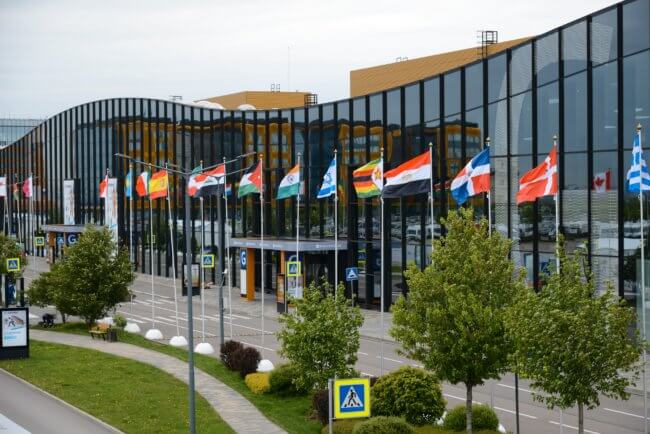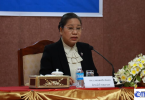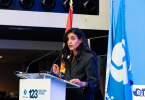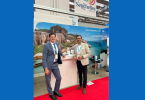The key theme of RCB’s participation at SPIEF’2109, presented in various formats was “Politics and Business: Effective Interaction for Development of the Event Industry.”
“As part of implementing the national project entitled “International Cooperation and Export” we have established high indicators in the volume of service export,” said Anton Kobyakov, Advisor to the President of the Russian Federation.” The event industry is one of the most effective generators of non-mineral resource export, and it can add significantly to budgets at different levels. This allows us to talk about the importance of including the issues of development and support of the national event industry into the work agenda of such significant events as the St. Petersburg International Economic Forum.”
Before the Forum the Russian Convention Bureau, with support of the St. Petersburg Congress and Exhibition Bureau and R&C Research and Information Center, held a business brunch on the topic “Subventions for Business Events as Tools of Effective Support of Business by the State.” The event was held in a lively discussion format. Representatives of regional structures as well as players on the market of the event industry shared their view of problems and approaches to subsidizing events, business cases and practical data.
Availability of regular state support is one of the most important topics for the development of the national event industry. One of the tasks on the agenda of RCB in its regional interaction programs is formation of recommendations for heads of regional representative offices which would help them provide systemic support for the industry on their respective territories.
The speakers at the business branch included Andrey Matsarin, General Director of the St. Petersburg Congress and Exhibition Bureau, Alexander Porodnov, Head of the Investment Promotion and Development Agency of Sverdlovsk Region, Alexey Kalachev, Director of the Russian Convention Bureau, and Slava Khodko, Advisor to the Director of the Roscongress Foundation. The session was moderated by Natalya Belyakova, Director for Marketing at Domina Russia, and Partner of the Center of Territorial Marketing.
The topic continued by the special session of the RCB entitled “Meeting Place Cannot Be Changed: En Route to Sustainable Development Via a Dialog Between Authorities and Business,” which took place on June 5, the first day of the Forum. Russian speakers and foreign experts who attended the roundtable discussion shared their views on importance of cooperation and the synergy between the authorities and business in the part of support of the national event industry. The participants in the session agreed that state support was necessary to help attract events into the country and proactively develop the sector in order to use all the advantages that these prospects offer.
The speakers at the session included: Elif Balci Fisunoglu, Regional Director for Europe International Congress and Conference Association ICCA (The Netherlands); Alexey Gospodarev, Director of the Department of International Cooperation of the Ministry of Energy of the Russian Federation; Vladimir Dmitriev, Vice President of the Chamber of Commerce and Industry of the Russian Federation; Alexey Kalachev, Director of the Russian Convention Bureau; Elena Semenova, Deputy Chairwoman of the Board, Russian-German Chamber of Commerce, Henrik von Arnold, Chief Consultant, ENITED Business Events, visiting lecturer, MODUL University of Vienna. The session was moderated by Dmitry Gornostaev, Deputy Editor-in-Chief of Russia Today International Information Agency.
possible to reach millions worldwide
Google News, Bing News, Yahoo News, 200+ publications
As part of its regional agenda, the Russian Convention Bureau signed a cooperation agreement on strategic cooperation with governments of Samara Region and Irkutsk Region. These regions are included in TOP 30 regions of the Russian Regions Event Potential Rating, and have significant prospects in terms of attracting business events to the territory of the region. The next step in cooperation will be the development of roadmaps, which contain concrete steps toward implementing the agreements.
Working on its mission to consolidate the industry on the home market and develop the national event industry, the RCB signed strategic agreements with S7 Airlines, according to which participants of Russian and foreign business events will get special discounts on S7’s own flights, and with the SRO Union of Exhibition Constructors, to work together on promoting legislative initiatives regarding the development of the national meetings industry and developing standards for construction of exhibition stands.
The RCB took part as an expert in such events of the SPIEF program as panel discussions. The session entitled “Main Principles of Forming Tourism and Recreation Zones” focused on the importance of developing business tourism as one of the components in the overall tourism flow, moreover, its most high-quality part in terms of economic effect. The session “Export of Culture: Opportunities for Presenting Russian Heritage on the International Arena” discussed the interrelation of the event industry and culture because availability of cultural sites in the region facilitates its growth and development as an event destination.
The RCB presented the Rating of the Event Potential of Russian Regions and introduced the Regional Passport Project, a case-study of Kamchatka, as part of the SPIEF Presentation Program in Roscongress Club for participants and guests of the Forum.
Alexey Kalachev, Director of the Russian Convention Bureau, commenting on the results of the RCB’s work at the St. Petersburg International Economic Forum, said: “Our work at the Forum was aimed at the idea of building the event industry into the national economy because completing the tasks within the area of RCB activities will help achieve target indicators in a number of national projects. Meanwhile, we would like to focus your attention on current problems and offer a number of promising development directions, with some of them based on cutting-edge world practices and Russian experience.”






